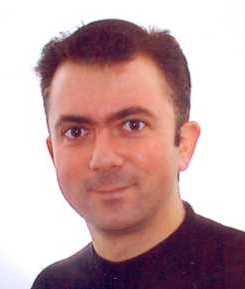CS Colloquium Series @ UCY
Department of Computer Science - University of Cyprus
The Department of Computer Science at the University of Cyprus holds research colloquiums and social hours approximately once weekly. All university students, faculty, and staff are invited to attend. Notifications about new and upcoming events are automatically disseminated to a variety of institutional lists.
If you don't receive these notifications, but want to get informed about upcoming colloquium announcements, you can do the following:
Colloquium Coordinator: Demetris Zeinalipour
Colloquium: Aspects of Neural Coding and Modelling Self-Control with Neural Networks Playing Games, Dr. Chris Christodoulou (University of Cyprus, Cyprus), Wednesday, November 3, 2010, 09:00-10:00 EET.
The Department of Computer Science at the University of Cyprus cordially invites you to the Colloquium entitled:
Aspects of Neural Coding and Modelling Self-Control with Neural Networks Playing Games
 |
Speaker: Dr. Chris Christodoulou |
Abstract:
This talk will be divided into two parts, the first concentrating on aspects of neural coding while the second describing an attempt to understand self-control and commitment behaviours through computational neuronal modelling.
The problem of understanding neuronal coding (i.e., how the brain encodes/decodes and transmits information) ranks today (after nearly twenty years) amongst the most important fundamental issues in computational neuroscience, since a solution would provide the basis for the analytical evaluation of the brain’s information processing capability and would give us a further insight as to those aspects which are essential to its functional organisation. This part of the talk will initially focus on providing an answer to what determines the highly irregular firing at high rates in real neurons. In particular, it will show that the partial somatic reset mechanism is the most likely candidate to reflect the mechanism used by the brain for this purpose. It will then demonstrate that high firing irregularity enhances learning and more specifically, reward-modulated spike timing-dependent plasticity with eligibility trace. Finally, an attempt will be presented on deciphering the neural code through distinguishing the causes of firing with the membrane potential slope. Such a distinction is likely to provide an answer to whether neurons use rate coding (suggested by temporal integration), temporal coding (suggested by coincidence detection) or a combination of the two.
Self-control can be defined as choosing a large delayed reward, while precommitment is the making of a choice with the specific aim of denying oneself future choices. Problems in exercising self control, suggest a conflict between cognition and motivation, which has been linked to competition between higher and lower brain functions or different value systems in the brain; in particular, parts of the limbic system are preferentially activated by decisions involving instant rewards, whereas regions of the prefrontal cortex are engaged uniformly by intertemporal choices irrespective of delay. This premise of an internal process model lead to a behaviour model being proposed, based on which we designed and implemented a computational model of self-control with two spiking or non-spiking neural networks representing the higher and lower brain systems viewed as cooperating for the benefit of the organism. As the structure of the self-control problem can be likened to the Iterated Prisoner’s Dilemma (IPD) game in that cooperation is to defection what self-control is to impulsiveness or what compromising is to insisting, we implemented the neural networks as two players, learning simultaneously but independently, competing in the IPD game. With a technique resembling the precommitment effect, whereby the payoffs for the dilemma cases in the IPD payoff matrix are differentially biased (increased or decreased), we showed that increasing the precommitment effect (through increasing the differential bias) increases the probability of cooperating with oneself in the future, irrespective of whether the implementation is with spiking or non-spiking neural networks. The contribution of this work to multiagent reinforcement learning will also be highlighted. This part of the talk will finish with an attempt to interpret our results on self-control through recent findings reported in the literature supporting that conflicts involving the delay of gratification, such as self-control problems lead to systematic changes in 'subjective experience' or consciousness. Can perturbations in consciousness, be related to the process of learning self-control behaviour by the brain in order to resolve the conscious conflict?
Short Bio:
Chris received a BEng degree in Electronic Engineering from Queen Mary and Westfield College, University of London (1991) and a PhD in Neural Networks/Computational Neuroscience from King's College, University of London (1997). He also holds a BA degree in German from Birkbeck College, University of London (2008). He worked as a Postgraduate Research Assistant (1991-1995) and a Postdoctoral Research Associate (1995-1997) at the Centre for Neural Networks, King's College, University of London. He joined Birkbeck College, University of London as a Lecturer in 1997 where he worked till August 2005 and he has also been a Visiting Research Fellow at King's College (1997-2001). From September 2005 he joined the University of Cyprus as an Assistant Professor and since then he is also a Visiting Research Fellow at Birkbeck College. Chris' research interests focus on Computational and Cognitive Neuroscience as well as on Neural Networks.
Note:
This colloquium is part of the speaker's procedure for evaluation and promotion from Assistant Professor to Associate Professor.
Sponsor: The CS Colloquium Series is supported by a generous donation from  |